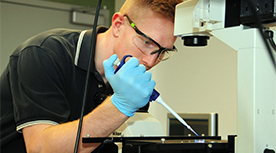PhD SCHOOL
 Because of LSDs low-prevalence, there is often a lack of information about them and it remains difficult to find clinicians knowledgeable about the diagnosis, management and treatment of these conditions. Getting a correct diagnosis is one of the major challenges for affected patients: it can take several years from the time of first symptoms to the one of disease recognition and initial treatment. Such delay in diagnosis has important implications since today many effective drugs for the replacement of the missing enzyme exist and if promptly used these drugs, can slow the pathological process of neurodegeneration and increase the patients life expectancy. It is therefore of paramount importance to diagnose the condition as soon as possible.
Because of LSDs low-prevalence, there is often a lack of information about them and it remains difficult to find clinicians knowledgeable about the diagnosis, management and treatment of these conditions. Getting a correct diagnosis is one of the major challenges for affected patients: it can take several years from the time of first symptoms to the one of disease recognition and initial treatment. Such delay in diagnosis has important implications since today many effective drugs for the replacement of the missing enzyme exist and if promptly used these drugs, can slow the pathological process of neurodegeneration and increase the patients life expectancy. It is therefore of paramount importance to diagnose the condition as soon as possible.
Besides the need for early diagnosis, and new research programmes to develop new treatments able to cross the blood brain barrier (BBB), an overriding problem is represented by the replacement of a generation of scientists and physicians who contributed to the advancement of knowledge and available therapies for specific rare diseases, who have reached pension age and are close to retirement. A number of laboratories and clinics have been already closed and many will face the threat of closure in the next 5 years.
The Brains for Brain Foundation believes that medical advances can be achieved in a more active way if we capitalize on our knowledge and talents and strengthen the link between doctorate education, policy activities and investments in research in this field. This could help address the disconnect between societal needs of children and the curricula of European biomedical researcher and healthcare professionals.
To this aim the Brains for Brain Foundation, in line with the core principles established by “Towards a Maastricht for Research” (The Maastricht for Research Manifesto, published by MEP Amalia Sartori and MEP Luigi Berlinguer in June 2013), has created a network of Universities and Scientific Societies to start a doctorate programme aimed at furthering the knowledge on neurometabolic diseases amongst young physicians and scientists in order to establish an European Network of specialized experts and maintain excellence in Europe.
The challenge of this European collaborative effort lies in addressing the gaps in research in the field of rare paediatric neurological diseases and limiting the brain drain created through the lack of career opportunities in this field in the EU. The development of a new form of cooperation across EU and the establishment of a new generation of educated specialists competent in rare pediatric neurological diseases diagnosis and management represents the first step towards the achievement of a fair, equitable and equal health care system.
